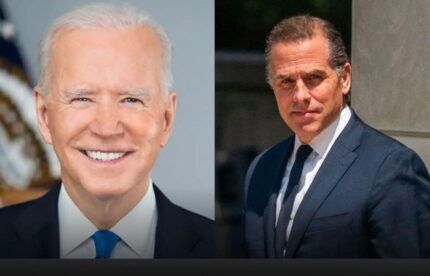U.S. President Joe Biden made history on Sunday by issuing a full and unconditional pardon for his son, Hunter Biden, who faced sentencing in two criminal cases. The younger Biden had pleaded guilty in September to federal tax fraud charges and was previously convicted in June for being an illegal drug user in possession of a firearm. This marked the first time in U.S. history that the child of a sitting president had been convicted of crimes.
The decision to grant clemency came as a shock to many, especially after the president had publicly ruled it out just months earlier. In his statement, Biden justified his decision, stating, “Politics has infected this process and it led to a miscarriage of justice.” He emphasized his commitment to maintaining independence within the Department of Justice while expressing his anguish over his son being “selectively, and unfairly, prosecuted.”
Political Backlash and Trump’s Sharp Criticism
The pardon has ignited intense political backlash, particularly from President-elect Donald Trump. Trump, who is set to return to the Oval Office in January 2025, accused Biden of double standards. Referring to the Capitol riot on January 6, 2021, Trump remarked, “Does the Pardon given by Joe to Hunter include the [6 January] Hostages, who have now been imprisoned for years? Such an abuse and miscarriage of Justice!”
Republican lawmakers and conservative media outlets have also criticized the pardon, suggesting it undermines public trust in the justice system. However, Democratic allies argue that the decision was a personal one, driven by Biden’s role as both a father and a president.
Hunter Biden’s Reaction and Journey to Sobriety
In his response to the pardon, Hunter Biden acknowledged his past mistakes and the political ramifications they brought to his family. “Mistakes I made during the darkest days of my addiction have been exploited to publicly humiliate and shame my family for political sport,” he stated. Expressing gratitude for the clemency, he vowed to dedicate his life to supporting others struggling with addiction.
Hunter, now 54, has been sober for over five years, a fact his father highlighted as a testament to his resilience and growth. The president’s decision, while controversial, sheds light on the personal struggles of the Biden family and the broader issues of addiction and recovery.
Historical Context and Political Implications
This is not the first instance of a U.S. president pardoning a family member. In 2001, Bill Clinton granted clemency to his half-brother, Roger Clinton, for a 1985 cocaine-related offense. Similarly, Donald Trump pardoned Charles Kushner, the father-in-law of his daughter Ivanka, in 2020.
President Biden’s decision to pardon Hunter comes at a critical juncture, as his presidency nears its conclusion and he has endorsed Vice President Kamala Harris to succeed him in the Democratic race. Political analysts suggest that the pardon, while risky, could rally support from Democrats sympathetic to Biden’s personal and political struggles.
The decision has sparked a national debate on presidential clemency, justice, and the influence of familial bonds on high-stakes political decisions. As Biden hopes for public understanding, the controversy surrounding the pardon is likely to remain a defining moment of his presidency.
Political Reactions and Future Implications
The pardon has predictably drawn sharp political reactions, with President-elect Donald Trump immediately criticizing the move. Trump questioned the clemency, pointedly asking whether the pardon would extend to his supporters arrested during the January 6th Capitol riots. This rhetorical challenge highlights the deep political divisions surrounding the Biden family’s legal challenges.
Hunter Biden’s legal troubles have been a persistent narrative throughout his father’s political career, casting a shadow over Joe Biden’s presidential campaign and subsequent presidency. The pardon represents a definitive, if controversial, attempt to close this challenging chapter. As Joe’s presidency nears its end, this decision will likely be remembered as a significant and polarizing moment in his political legacy.














